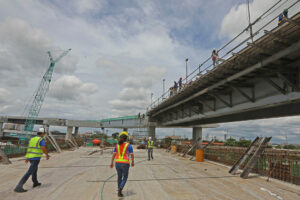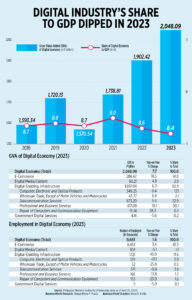ENHANCEMENTS to infrastructure and governance are key to attracting foreign investors, not just opening up the economic provisions of the 1987 Constitution, analysts said.
“Attracting FDI (foreign direct investment) is not just about economic provisions (of the Constitution), it’s also about maintaining a good socio-economic-political environment conducive to the conduct of business,” John Paolo R. Rivera, president and chief economist at Oikonomia Advisory & Research, Inc., told BusinessWorld in a Viber message.
Legislators have pitched the Charter reform campaign as a means to open up industries to foreign capital and encourage more FDIs.
The Philippines has one of the most restrictive economies in Southeast Asia as the Constitution limits foreign participation to a 40% equity stake in most domestic companies. The Philippines ranked third most restrictive out of 83 economies — scoring 0.374 on a scale of 0 (open) to 1 (closed) — according to a 2020 FDI analysis by the Organization for Economic Co-operation and Development.
“The RBH (Resolution of Both Houses) No. 7 is necessary but not sufficient,” Foundation for Economic Freedom President Calixto V. Chikiamco told BusinessWorld via Viber, referring to how the proposal could open the economy to foreign investment.
He added: “RBH No. 7 just inserts the phrase ‘unless otherwise provided by law’ (into the Constitution), meaning Congress has to pass a specific law first in order to open up education, advertising, and public utilities to 100% foreign investment.”
While ease of doing business policies and a well-managed economy are important factors for foreign investors, Mr. Rivera said that “good housekeeping and good governance” are also key considerations for foreign investors.
He added that the Philippines should also have “excellent infrastructure” to further attract foreign investment.
“Key infrastructures are those involving our connections to the world: airports, ports, shipping, warehouses, and broadband connectivity,” Mr. Chikiamco said.
Terry L. Ridon, a public investment analyst and convenor of think-tank InfraWatch PH, said the “administration’s flagship infrastructure program is off to a good start” with the expected rehabilitation of Ninoy Aquino International Airport by the San Miguel Corp.-led consortium.
“(The) government is also well on its way to process other PPPs (public-private partnerships),” Mr. Ridon told BusinessWorld via Viber. He said the proposal by Aboitiz InfraCapital, Inc. to develop regional airports and other pending projects for the“EDSA busway project and the MRT-3 redevelopment would help improve infrastructure overall.
He added that increasing FDI inflows also depends on “sector-specific equity restrictions, the governance climate, and sustainability commitments, among others.”
“There is no single leading factor that ensures FDI inflows, but the government should work towards improving outcomes in these various areas,” Mr. Ridon added.
The Philippines is on the right track to improve FDI, Mr. Chikiamco said, referring to the efforts of the government to reform its policies and upgrade infrastructures.
“(The) government is active in improving the investment climate but it will take time before the benefits are reaped,” Mr. Rivera said. — Kenneth Christiane L. Basilio






